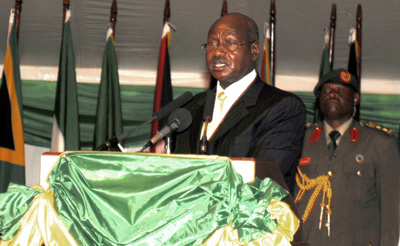Ugandan President Museveni urged his peers at this week’s African Union summit to unite in the battle against terrorism in the aftermath of the terrible 7/11 bombings in Kampala. Security measures pursued by Ugandan authorities after the twin bombings, however, have left some Ugandans and other East African residents wary. East African journalists were among those detained by Ugandan security forces following the bombing. Uganda’s parliament, meanwhile, quickly passed a telephone surveillance bill.
The pursuit of stronger security in Uganda is understandable. The Somali Al-Shabaab, which claims links to Al-Qaeda, claimed responsibility for the bombings; Ugandans, whatever their ethnicities, should not have to live in fear of a terrorist threat. But determining whether a counter-terrorism measure actually improves public safety or simply increases state authority is a key step.
As Muslim-Americans felt a backlash from authorities and citizens after the 9/11 terrorist attacks in the U.S., so too are Somalis residing in Uganda. At least 20 Somalis were arrested last week, according to the Ugandan daily, New Vision. One of those in custody, Bille Abdullahi, is a former reporter for the independent Somali broadcaster, Radio Shabelle, according to a fellow exiled Somali journalist living in Kampala.
“I remember hiding in our office back in Somalia, like a prisoner, fearing the Shabaab would attack us,” said the exiled journalist who spoke on condition of anonymity for fear of reprisals. “Now I hide in my house in Kampala, fearing people will accuse me of being Al-Shabaab. Is this living, really? I sometimes wonder.” An Ethiopian journalist told me that Ethiopians and Eritreans living in Uganda are also targeted because, to some extent, they resemble Somalis. Police briefly detained the journalist and two colleagues after the bombing and told them they would be under surveillance.
Just days after the bombing, Uganda’s parliament passed a phone-tapping bill. “The law effectively turns Uganda into one Big Brother House,” columnist Isaac Mufumba wrote in The Independent magazine. “Big Brother will listen in to your conversations with your wife, friend, or colleague and read text messages and e-mails to and from your spouse and friends,” he warned. The Interceptions and Communications Bill would require mobile users to register their SIM cards for security purposes, and would create a new monitoring center.
After the 9/11 terrorist attacks, the U.S. House and Senate adopted the Patriot Act as a way to counter terrorism. An understandably concerned American public acceded to broad measures empowering federal law enforcement to gather intelligence and investigate those suspected of terrorism. But over time some Americans grew wary, seeing it as legislative overcompensation enacted in a time of crisis.
In some respects, Ugandan MPs have taken the need for balance into account in regard to the Interceptions of Communications Bill. An earlier proposal to hand the security minister absolute power to issue warrants for interception was thrown out and the power given to judges instead. It is now up to President Museveni, who is expected to sign the bill into law, and Uganda’s security forces to ensure the public’s safety and their liberty.
